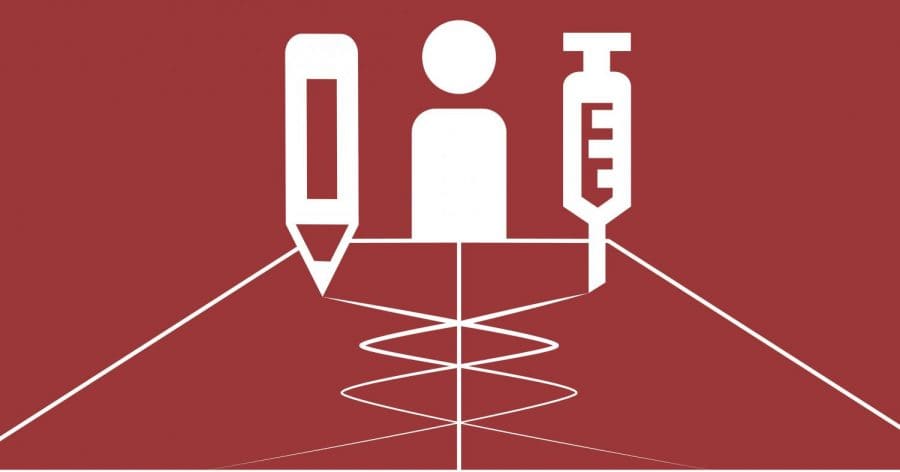Opinion | Creativity is the cure
Modern medicine is an art. And it should be appreciated as such.
March 10, 2021
In the parking lot adjacent to Tuscaloosa’s local hospital, my car hummed under a tent when a needle went into my arm. I felt a small pulse of pain, and I imagined the vaccine tumbling across my body like some fluid or microscopic force shield, or some video-game version of holographic armor. It was done.
I got my first dose of Pfizer’s vaccine, and I’ll get my second in three weeks. I was eligible for this shot because I am an educator at The University of Alabama and work part-time in food service. I was greeted by a man in scrubs taking temperatures. “Been here since six this morning,” he said. It was the early evening now. Other medical staff greeted me and checked me in: A man with a gold earring and a soft Southern accent processed my paperwork. A gregarious, loud and laughy woman set up my next appointment. Another woman quietly administered the vaccine into my arm. There were ramps, tents, sheds, oxygen tanks, scrubs, masks, gloves, vials, syringes, flood lights, the fast movement of medical purpose. I waited in a parking lot for 15 minutes to see if I had symptoms (I had none) while people from the sheriff’s department sat under a tent, looking bored. The deputies collected timers as people honked horns that signaled that they were ready to go home.
Eleven months since the U.S. went into lockdown, after nearly 30 million Americans have become infected with COVID-19, the vaccine is the country’s ultimate tool to end the pandemic. Perhaps I think this because I am a graduate student in the Creative Writing Program, but this tool, the vaccines that have been created, feel like the ultimate expression of creativity – a gift that any eligible person should get when they can. Back in the spring of 2020 and in early summer, the vaccine was a mere fiction, a burble of hope, an idea and flurry of creation, backed by governments, private companies and billions of dollars. It represented an investment and hope. Amazingly, I now have this piece of technology: The fastest vaccine ever. The zoonosis spilled over into humans from bats (probably), passed from human to human, country to country, leading to a global pandemic, lockdowns and the alarm of death and sickness. Off go the engines of science laboratories, money spent by the billions, and thousands of creators and collaborators rushing to create something so needed.
Art, like writing a novel or drawing, takes the same basic journey as creating a new medicine. It starts with an idea and a need to create. Then spurts of that idea turn into a plan. Drafts come from trial and error. Then others test the drafts, distribute the product for the public to experience. And like any piece of good writing or art, this vaccine is safe and people should take it.
In his book “I Contain Multitudes,” science writer Ed Yong calls the immune system not an “armada of destructive troops, belligerently bent on destroying microbes” but instead as a “team of rangers in charge of a national park—as ecosystem managers” who must carefully control “the number of resident species and expel problematic invaders.” Adding a vaccine to my body, if I am reading him correctly, is like adding a park ranger to my immune system. Having a vaccine injected into your body creates a “memory” for the park ranger. Your T- and B-lymphocyte cells adapt and recognize symptoms of a virus that may enter the park (your immune system).
The vaccine is a colossal scientific achievement. It’s bonkers. It’s a rocket ship. It’s an underwater train system. It’s the most kick-ass television show, book or musical performance you’ve ever experienced. It gives people life. Don’t people say that when they encounter art? “This gives me life!”? In the case of vaccines, it’s literal. Better yet, by getting it yourself, you give other people life.
Works of art are a gift. What will we do with this gift of a vaccine? Will we use it? If a vaccine like Pfizer, Moderna, Johnson and Johnson, can be created in the time that it has, what else could we create? Better health systems, mental health infrastructure, cheaper pharmaceutical drugs (like insulin), better access to healthcare for non-white communities? Let’s use this gift. Let’s vote for smart people and make others gifts. Lets fund creators and give access.
Vaccines are safe. When your turn comes––and it will––use this gift. The faster this pandemic will end, the faster we can get on to making other gifts.
Tucker Legerski is a graduate student studying creative writing. His column runs regularly.





















